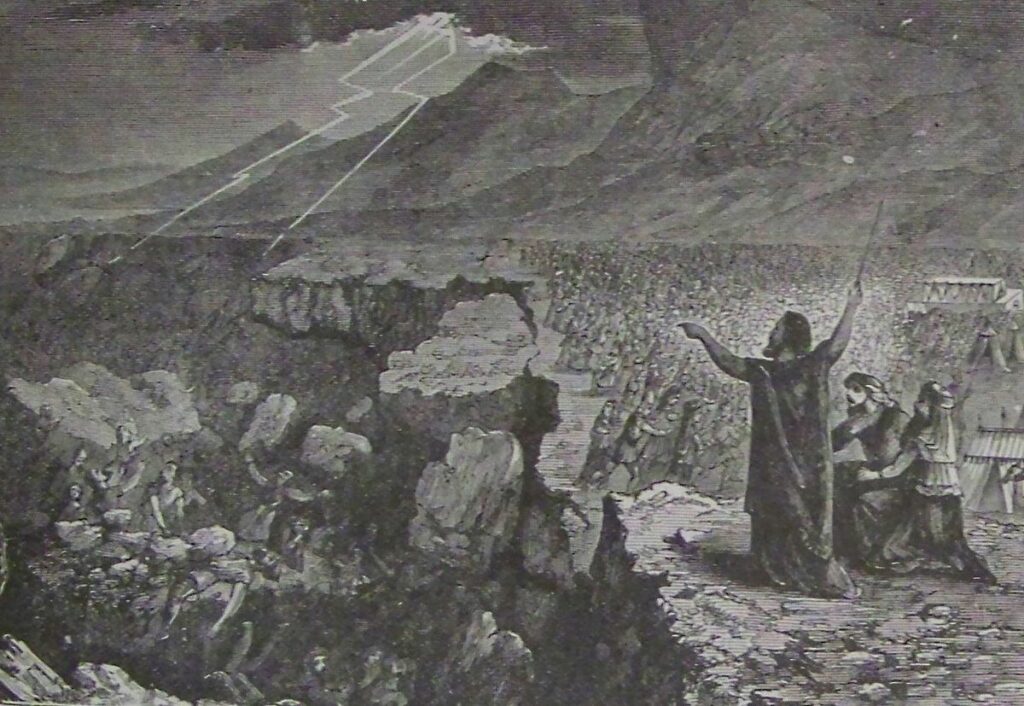
The Old Testament book of Numbers is the story of the 40 years that the Israelites wandered in the Wilderness of Sinai. (I’ve written on the book’s larger significance here.) This whole period is of course a judgment for the nation’s unbelief at Kadesh-barnea; because Israel did not believe that God would give them the land he had promised to Abraham and his descendants, that unbelieving generation would die in the Wilderness, and their children, for whose lives they had feared, would take the land instead (Nu 13.26-14.35).
It’s no surprise, then, that we find individual acts of judgment popping up throughout the book. One of the most remarkable of those is what we call Korah’s rebellion; it’s notable for both the starkness of the judgment and the extravagance of the mercy that God extended.
We find the account in Numbers 16, a longer-than-usual chapter. We meet two relatively small groups of Israelites who believe that Moses and Aaron have taken more authority on themselves than they should have. The leader of one group is Korah, a Levite, and in fact a first cousin of Moses and Aaron (Ex 6.18, 20; Nu 16.1). The two leaders of the other group are Dathan and Abiram, members of the tribe of Reuben (Nu 16.1)—who, incidentally, was Jacob’s firstborn and rightful heir, but who lost the primogeniture for sleeping with his father’s concubine (Gn 35.22; 49.3-4). It’s easy to see how all three of those men would have been jealous of Moses’ authority— “why him and not us?”
Their charge is that Moses and Aaron haven taken this authority upon themselves illegitimately (Nu 16.3, 13). Evidently, they see as evidence of that the fact that Israel has not entered the Promised Land (Nu 16.14)—which seems weak evidence, given that the people themselves had refused to go in.
Moses’ response to the challenge is straightforward. Do Korah and his followers want to be priests alongside his cousin Aaron? Well, then, they should bring censers before the Lord alongside Aaron, and we’ll see what the Lord has to say about that (Nu 16.16-19).
And so they do. There are 250 men, each with a smoking censer, standing next to Moses and Aaron.
The glory of the Lord appears (Nu 16.19), and, remarkably, Moses begins to intercede for those facing judgment (Nu 16.22). And at the Lord’s command, Moses warns the whole congregation to get away from the rebels to avoid their fate (Nu 16.24-26).
As always, some believe the prophet, and others don’t. They act—or don’t act—in accordance with their belief, and unbelief brings consequences. In this case, the earth opens and swallows the rebels (Nu 16.31-33).
God orders the survivors to make metal plates from the rebels’ censers and to cover the altar with them (Nu 16.38). There will be a permanent reminder of the sin that brings judgment (Nu 16.40).
But this is not the end of the story.
Incredibly, rebellion continues. “All the congregation” accuses Moses of having killed good people (Nu 16.41).
Isn’t this ludicrous?! The earth opened up, for crying out loud. Shouldn’t that be an indication that Moses had supernatural backing? And “all the congregation” is unable to see what’s plainly before their eyes?!
Yikes.
And here comes the glory of the Lord, for the second time (Nu 16.42). A plague begins to spread among the people (Nu 16.46), and Moses sends Aaron out through the camp with a burning censer—a legitimate one (Nu 16.47).
“And he stood between the dead and the living, and the plague was stopped” (Nu 16.48).
This is not a pleasant episode in Israel’s history. I’m confident that none of us would want to have been there to see it.
But, as always, there is grace throughout this account, and even more grace to follow. We’ll consider that aspect of the story next time.
Photo credit: publishers of the 1890 Holman Bible, Public domain, via Wikimedia Commons

Leave a reply. Keep it clean.